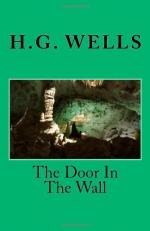|
This section contains 170 words (approx. 1 page at 400 words per page) |

|
Since its first publication, "The Door in the Wall" has been recognized by critics as one of Wells's most accomplished stories. In 1924, Alfred C. Ward published a short interpretation of the symbolism of the garden in his Aspects of the Modern Short Story, paying particular attention to the theme of the deceptive natures of time and happiness. Among other critics, Bernard Bergonzi, in his The Early H. G. Wells (1961), has also examined the symbolism of "The Door in the Wall." Such critics as Roslynn D. Haynes and J. R. Hammond have studied the story's themes, focusing on the conflict between science and the imagination, and between reality and the projections of the imagination—noting that the difference between them is often hard to distinguish. Jerome Hamilton Buckley, in an essay in his The Triumph of Time (1969), has suggested that the story's ending is open to interpretation...
|
This section contains 170 words (approx. 1 page at 400 words per page) |

|




